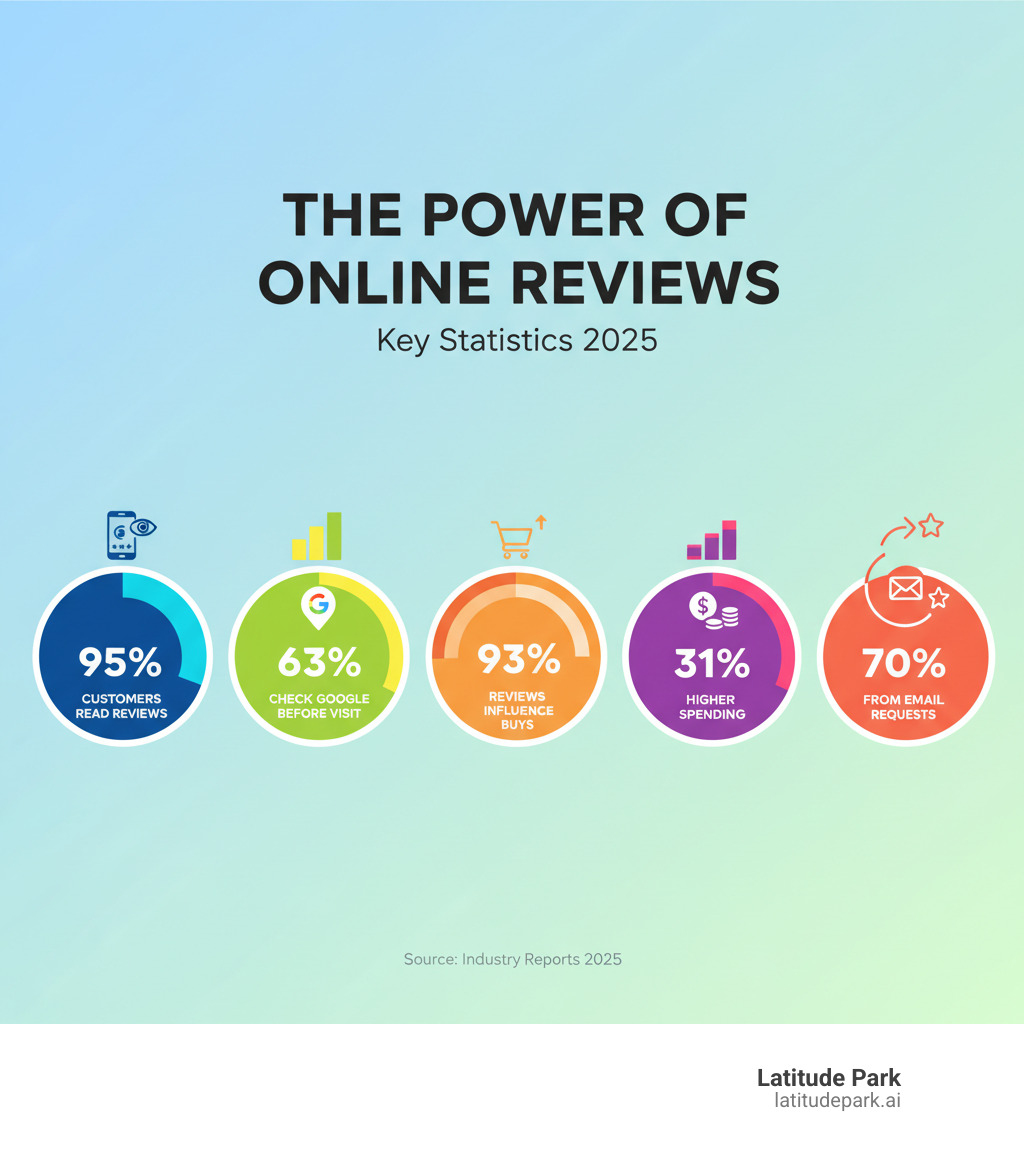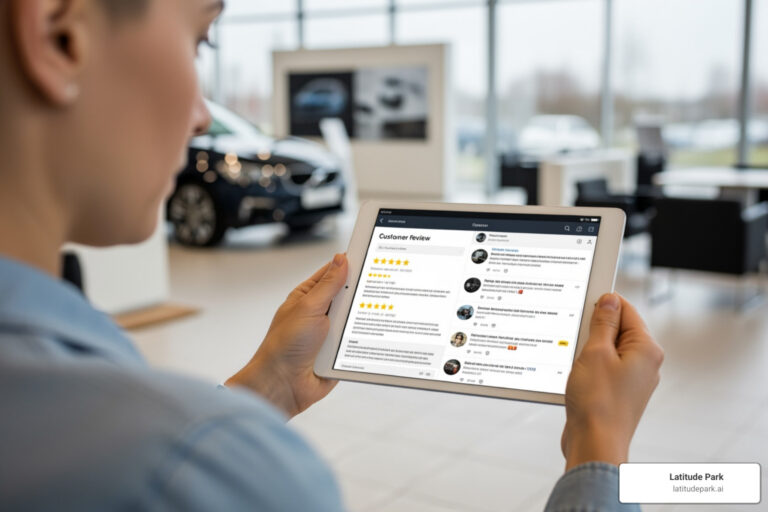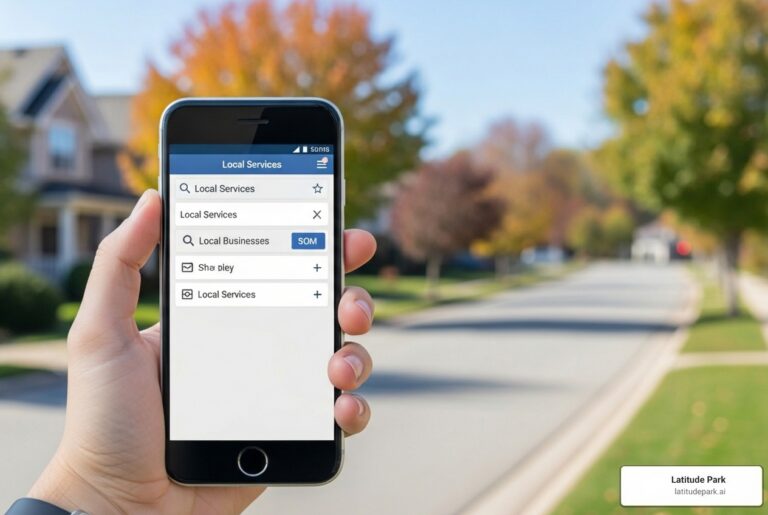Why Online Review Marketing is No Longer Optional
Online review marketing is the practice of generating, managing, and leveraging customer reviews to build your brand’s reputation and drive growth. It involves actively soliciting feedback, responding to all reviews, showcasing positive testimonials, and analyzing the data to improve your business.
Why does it matter? Because 95% of customers read online reviews before making a purchase. Your potential customers are reading about you right now, and their decisions are influenced by what they find. For franchise marketing managers, a systematic approach to review marketing is essential for maintaining brand consistency and making management across multiple locations easier.
I’m Rusty Rich, founder of Latitude Park. With over 15 years of experience in digital marketing for franchises, I’ve seen how a strong review strategy can transform a business. In this guide, I’ll show you how to turn customer feedback into your most effective marketing asset.

The Undeniable Impact of Online Reviews on Customer Behavior
When was the last time you bought something without checking reviews? You’re not alone. Over 99.9% of customers read reviews when shopping online, and 93% say those reviews influence their decision to buy. For physical businesses, 63% of people check Google reviews before visiting. Your reviews are your digital storefront, making first impressions 24/7.
The financial impact is substantial. Businesses with excellent reviews see customers spend 31% more. This is why online review marketing has become an essential strategy for actively shaping your brand’s reputation and creating a revenue-generating asset.

What Customers Really Look For in Reviews
Customers look for several key signals to determine if they can trust your business:
- Star Rating: The ideal rating is between 4.2 and 4.7 stars; it feels more authentic than a perfect 5.0. Most customers won’t consider a business with a rating below 3.3 stars.
- Quantity: More reviews build more confidence. 60% of customers look at the number of reviews a business has before making a decision.
- Quality and Detail: Specific, detailed reviews are more persuasive than generic comments. Surprisingly, 96% of customers seek out negative reviews to understand potential downsides.
- Recency: A review needs to be recent to be relevant, typically within the last six months. This is why a proactive online review strategy is crucial.
- Your Responses: Customers notice if you respond to feedback. A thoughtful response to both positive and negative reviews builds trust.
How Reviews Build Trust and Drive Sales
Why do reviews hold so much power? Because we trust other people more than we trust advertising. In fact, 85% of people trust online reviews as much as a personal recommendation from a friend. This trust lowers perceived risk and creates an emotional connection before a customer even interacts with you.
For franchises, strong reviews at every location create a compounding effect, reinforcing the brand promise and making each sale easier. The bottom line is that great online business ratings help your company succeed by acting as a tireless, 24/7 sales team that turns browsers into buyers.
Building Your Foundation: How to Encourage a Steady Stream of Positive Reviews
Most happy customers are willing to leave a review; they just need to be asked. The foundation of successful online review marketing is a great customer experience, followed by a system that makes asking for feedback natural and easy.
Over 70% of satisfied customers will leave a review when asked. The key is to make the request timely and simple, so saying yes feels effortless.

The Core of Your Online Review Marketing Strategy: Just Ask
The most effective strategy is simple: just ask. But timing and approach matter.
- Time it right: Ask for a review when the positive experience is fresh. For products, wait about a week after delivery. For services like a restaurant or haircut, ask immediately.
- Personalize the request: Use the customer’s name and reference their specific purchase. A personalized email feels like a conversation, not a marketing blast.
- Make it easy: Provide a direct link to your Google Business Profile or preferred review platform. Use QR codes on receipts or table tents for in-person requests. The easier you make it, the higher your response rate will be, which is why you should always encourage user reviews.
For franchises, a consistent, streamlined process across all locations is crucial for success.
Navigating the Risks of Soliciting Reviews
When asking for reviews, it’s important to follow the rules to maintain authenticity and trust.
First, avoid review-gating—the practice of filtering customers and only sending happy ones to public review sites. Most platforms, including Google and Yelp, prohibit this. It’s seen as manipulative and can lead to penalties. Your goal should be to gather genuine feedback from all customers.
Second, be cautious with incentives. Offering rewards for positive reviews is unethical and forbidden by most platforms. Some sites may permit incentives for any honest review (positive or negative), but policies vary. For example, Google’s policy is very clear about what is and isn’t allowed. Always check each platform’s specific guidelines. The safest and most effective strategy is to earn great reviews by providing excellent service, not by trying to buy them.
Mastering Your Presence: How to Manage Reviews Across Key Platforms
Once reviews start coming in, the real work of online review marketing begins. It’s a conversation, not a monologue. Responding to reviews shows potential customers you value feedback, and it’s expected—over half of customers want a response within a week.
For franchise managers, this means having a system for consistent, timely responses that maintain a unified brand voice. This is the core of our review management ultimate guide approach.
Which Review Platforms Matter Most?
Focus your efforts on the platforms where your customers are most active. For most businesses, these are the essentials:
- Google Business Profile: This is non-negotiable. With 63% of consumers checking Google reviews before visiting a business, it’s often your first impression and a major factor in local search rankings. Our Google Reviews management guide can help you optimize it.
- Facebook: A key platform, especially for local and service-based businesses. Its social nature means reviews can be shared widely. Learn how to manage reviews on Facebook to maintain your brand presence.
- Yelp: Highly influential for restaurants, retail, and local services. Yelp strictly prohibits soliciting reviews, so your focus here should be on monitoring and responding to organic feedback.
- Industry-Specific Sites: Depending on your business, sites like TripAdvisor (hospitality), G2 (software), or Healthgrades (healthcare) may be critical. Our guide on what to look for in the best business review sites can help you identify them.
The Art of the Response: Handling Positive and Negative Feedback
Your responses are a public display of your customer service. Here’s how to handle both types of feedback.
For positive reviews:
- Personalize it: Use the reviewer’s name and mention a specific detail from their review.
- Show gratitude: Offer a genuine thank you for their time and feedback.
- Invite them back: End with a warm invitation to return.
For negative reviews:
- Acknowledge and apologize: Address their specific complaint and offer a sincere apology for their negative experience.
- Don’t argue: Never get into a public debate. Your goal is to show you’re professional and committed to a solution.
- Take it offline: Provide a direct phone number or email address and ask them to contact you to resolve the issue. This shows you’re proactive without airing dirty laundry in public.
Responding quickly and professionally, as outlined in our online review management for dummies: reviews from the ground up guide, can turn a negative situation into a demonstration of your brand’s character.
Advanced Online Review Marketing: Turning Feedback into Fuel for Growth
You’ve mastered the art of collecting reviews and responding to them professionally. But here’s where things get really exciting: those customer testimonials sitting on Google and Facebook aren’t just feedback—they’re marketing gold waiting to be mined. Think of every positive review as a mini-advertisement written by someone who actually paid for your product or service. That’s the kind of authentic endorsement money simply can’t buy.
The beauty of online review marketing at this advanced level is that you’re taking authentic customer voices and amplifying them across every marketing channel you have. This isn’t about creating more content—it’s about leveraging the best content you already have: real customer experiences.

Leveraging Reviews in Your Marketing and Brand Building
Don’t let your best reviews sit unseen on third-party sites. Integrate them into your marketing to maximize their impact:
- On Your Website: Displaying reviews on product and service pages can increase conversion rates by up to 120%. Use widgets to automatically pull in fresh testimonials and star ratings.
- In Social Media: Use real customer quotes and star ratings in your ads. User-generated content is seen as more authentic and can significantly improve ad performance.
- In Email Marketing: Including reviews in promotional emails or abandoned cart reminders can boost click-through and purchase rates by building social proof at key moments.
- For SEO and Ads: Reviews provide fresh, keyword-rich content that improves local search rankings. A strong review profile can also help you qualify for Google Seller Ratings, making your paid ads stand out and potentially lowering your cost per click.
This integrated approach is central to effective strategies: building & managing brand online reputation.
Measuring the ROI of Your Online Review Marketing Efforts
To know if your strategy is working, you need to track the right metrics. Here are the key performance indicators (KPIs) to monitor:
- Review Volume and Velocity: The number of new reviews you’re generating weekly or monthly.
- Average Star Rating: Your overall score across platforms. Aim for the 4.2-4.7 star range.
- Sentiment Analysis: The themes and keywords (positive or negative) emerging from review text.
- Website Conversion Rate: The change in leads or sales after adding reviews to your site.
- Local Search Rankings: Your position in “near me” searches and Google’s local pack.
- Referral Traffic: Clicks to your website from review platforms.
Tracking these metrics, as we do for clients with our reviews and reputation management services, provides a clear picture of your ROI and highlights opportunities for growth.
Frequently Asked Questions about Online Review Marketing
Here are concise answers to some of the most common questions we hear about online review marketing.
What’s the difference between review marketing and reputation management?
Think of it this way: review marketing is the proactive process of generating and showcasing customer reviews. It’s a specific tactic. Reputation management is the broader strategy of monitoring and influencing your brand’s entire public perception, which includes reviews, social media, and news coverage. Review marketing is a key part of a comprehensive reputation management plan, like our LP Services: Reputation Management offering.
Is it okay to offer incentives for reviews?
This is a gray area, so be cautious. Offering incentives for all honest reviews (positive or negative) may be allowed on some platforms, but paying for or soliciting only positive reviews is unethical and against the rules. It can get your business penalized and destroy customer trust. Always check the specific guidelines for each platform (like Google, Facebook, and Yelp) before launching any incentive program. The best approach is to earn authentic reviews through excellent service.
How should I handle a fake or malicious review?
First, do not engage in an angry or defensive public argument. It will only make your business look bad. Instead, follow these steps:
- Respond Professionally: Post a brief, calm public reply. State that you have no record of the customer and invite them to contact you directly to resolve the issue.
- Flag the Review: Use the platform’s built-in tools to report the review as fake or malicious. Provide any evidence you have that it violates their policies.
Your professional response is often more important than the fake review itself, as it shows potential customers that you are reasonable and responsive.
Conclusion: Make Your Reputation Your Strongest Asset
Online review marketing is no longer optional; it’s the foundation of how modern customers make decisions. From building trust to driving sales, your reviews are actively shaping your business’s future right now.
We’ve covered how to generate a steady stream of authentic feedback, manage your presence across key platforms, and leverage those reviews to fuel your growth. For franchises, a systematic approach is the key to maintaining brand consistency and gaining a competitive edge across all locations.
Doing this well requires time and expertise. At Latitude Park, we specialize in helping multi-location franchises implement scalable and effective review strategies. Our review management services handle the heavy lifting, from monitoring and responding to reviews to integrating them into your broader marketing efforts.
Your reputation is being written by your customers. It’s time to take control of the narrative. Let’s talk about turning your customer feedback into your most powerful marketing asset.









